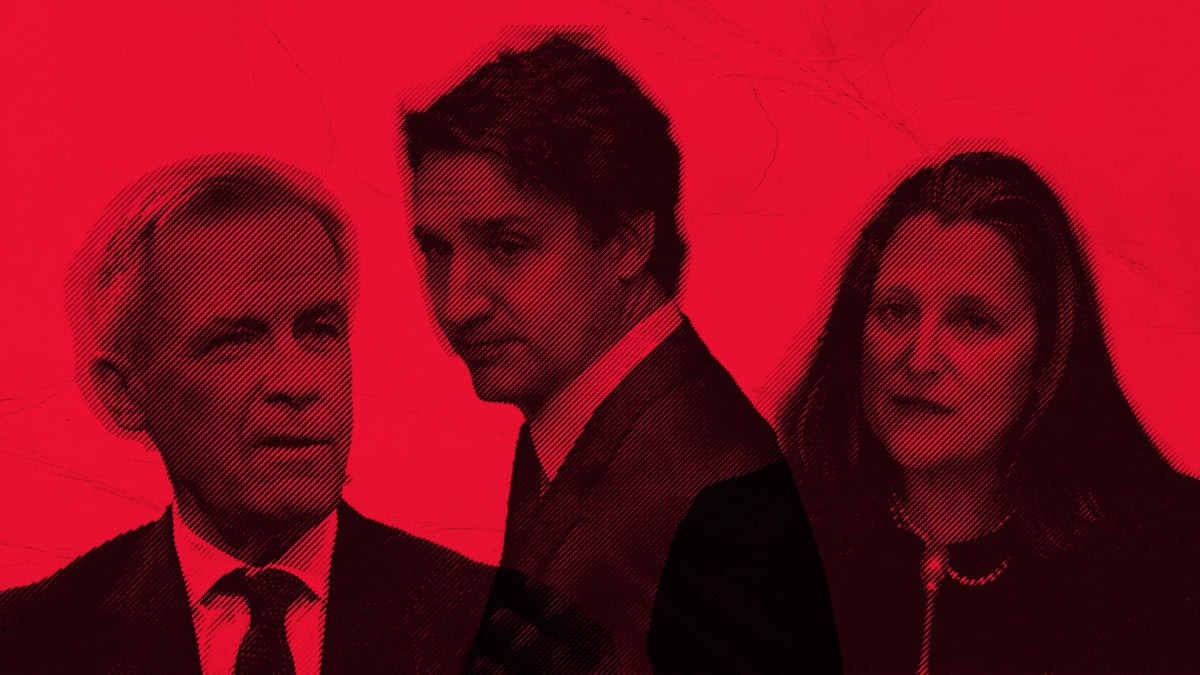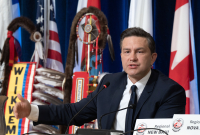Support strong Canadian climate journalism for 2025
As rumours mount that Prime Minister Justin Trudeau wants to recruit former Bank of Canada governor Mark Carney as the next finance minister, climate advocates say finance has long been a missing piece of the country’s climate strategy.
The Globe and Mail reported last week that the Prime Minister’s Office is frustrated with Finance Minister Chrystia Freeland’s inability to communicate the government’s economic message, and has spoken with Carney to bring him on board as a replacement.
Speaking at the NATO Summit in Washington Thursday, Trudeau conceded he has “for years now” tried to recruit Carney as a ringer for the Liberal Party, saying “he would be an outstanding addition at a time Canadians need good people to step up on politics.”
Trudeau added he has “full confidence” in Freeland, but that may be cold comfort given he had “full confidence” in former finance minister Bill Morneau in 2020 before he resigned about a week later amid policy clashes with the PMO. He also said he had “full confidence” in Jody Wilson-Raybould the day before she stepped down during the SNC-Lavalin scandal.
Carney comes with pedigree. As the former governor of both the Bank of Canada and the Bank of England, and currently chairing Brookfield Asset Management and the Glasgow Financial Alliance for Net Zero (GFANZ), Carney has fashioned himself a champion of the financial sector’s role in getting to net-zero.
Given his role at the Bank of Canada during the 2008 recession, when he was largely credited with a strong handling of the crisis and even named as the only central banker on TIME’s “most influential” list, the logic for recruiting him now is clear. For supporters, having Carney’s steady hand join the team would be a way to counter Conservative attacks that Liberals are reckless with the economy. Although, to skeptics, recruiting a central banker is a risky tactic for a government floundering for support during a cost-of-living crisis.
Carney did not return a request for comment. But in recent years, he has sketched out a few priorities for Canada’s approach to the energy transition in various platforms.
In his capacity as the United Nations special envoy for climate action and finance, he’s called climate change “an existential threat,” that will reward businesses playing their part to cut emissions and punish those that don’t.
“Low carbon is becoming the driver of competitiveness as the clean revolution takes shape from Melbourne to Mumbai, from New York to Nairobi,” he wrote last year in an opinion piece published in The Globe and Mail. He emphasized the challenge ahead is change “on the scale of the Industrial Revolution at the speed of the Digital Transformation.”
“Now is not the time for laissez faire. We need the engagement of all levels of government, industry and finance,” Carney wrote. “Walls of private money are now chasing opportunities and turning them into jobs.”
Carney says climate change is a pressing threat and monumental opportunity for businesses to rake in huge profits, but it’s not clear how significantly different his views are from Trudeau’s government. Carney has endorsed uncontroversial climate positions, including the importance of net-zero transition plans and setting interim emission reduction targets. He’s also spoken of the important role carbon capture technology and hydrogen will play in Canada’s economic future, all shared priorities with Trudeau’s government.
Bay Street’s view
For years now, Carney’s view of the energy transition has focused on attracting private investment into the process. Whether through public-private partnerships, “blended finance” with private capital and multilateral development banks, or tax credits, his goal is clear: make investing in the energy transition more profitable for the private sector to encourage more investment.
In that way, he sees finance playing a vital role in the transition, but fundamentally doesn’t see banks, asset managers, pension funds and other financial institutions in the driver’s seat. It’s a position shared by some bank CEOs who speak of the importance of the energy transition, but say they require the government to take the lead.
“Finance cannot drive this transition on its own,” he told the Senate’s banking committee in May. “Finance is an enabler, a catalyst that will speed what governments and companies initiate.”
Carney has echoed the government’s concerns over greenwashing — of course, from a finance and market-based perspective. Carney told the Senate committee that he supports requiring better disclosure of climate risks and transition plans from financial institutions, creating guidelines for investors to determine what counts as green and what doesn’t, and having regulators run various warming scenarios to stress test company plans to better understand the climate risks to the economy.
After this year’s federal budget was presented, Carney took a swipe at the plan presented by Trudeau and Freeland, warning of “constant spending” and government subsidies. That raised eyebrows for some, given he has previously spoken of the need for governments to play a major role in the energy transition by providing funding.
Caroline Brouillette, executive director of Climate Action Network Canada told Canada’s National Observer that this kind of criticism of spending and subsidies carries a “sense of fiscal conservatism,” that is ill-prepared for the moment we’re in, which will require tremendous spending to slash emissions and adapt to warming already locked in. “What we need is actually for the [financial] sector to be regulated,” she said.
One critical regulation for climate advocates, that Carney disagrees with, is requiring financial institutions to hold more capital in reserve when investing in fossil fuel projects. Putting aside more money creates a shock absorber for banks in case a fossil fuel company cannot pay back its loans. But setting aside more money means the bank has less money to invest and generate profits.
“I think that for a couple of years now, we've seen the finance ministry being underutilized in terms of using its full power, capacity and tools to meet the climate crisis at the scale and speed needed,” Brouillette said. “So there's definitely some opportunities at [the ministry of] finance... to contribute fully to climate action in Canada.”
Carney vs Freeland
While it remains unclear how exactly Carney would steer the finance department if he was put in charge, he has publicly taken shots at Freeland’s handling of the file.
At a sustainable finance conference hosted in Ottawa last November, Carney said Canada could be a clean-energy superpower, but it needs a sustainable financial system. He pointed to the Sustainable Finance Action Council (SFAC) taxonomy roadmap published in 2022 that recommended ways to help align the Canadian financial sector with sustainable finance goals.
“As yet, those recommendations have not been answered,” Carney said. “My point: the world is moving forward on a transition [and] Canada has a good — I'd suggest, great — roadmap.
“We need someone to drive the car.”
A top priority in the SFAC roadmap was developing a “sustainable finance taxonomy” to define sustainability terms — to make it clear to investors what counts and what doesn’t, if you’re going to claim investments are sustainable.
As previously reported by Canada’s National Observer, the chief reason the taxonomy has been delayed is because of persistent efforts from Freeland’s office to include fossil fuels in it.
Would Carney help turn Liberal fortunes?
If Carney is interested in becoming finance minister, there are a few ways he could be looped into cabinet. He could potentially be the candidate in the upcoming LaSalle—Émard—Verdun byelection in Montreal where Liberals expect to win, or he could be appointed to the Senate and added to cabinet from there.
Trudeau could take a page from former prime minister Stephen Harper who tapped unelected party insider Michael Fortier to be his public works minister in 2006.
Don Desserud, a University of Prince Edward Island political science professor, said if Carney joins the Liberals, “it will certainly help the rank-and-file Liberals feel better about their party, but I wouldn’t take it much further than that.”
For Desserud, supporters that have jumped ship to Pierre Poilievre’s Conservatives aren’t coming back to the Liberals just because they could grab a big name like Carney. Rather, the task for Trudeau’s team is to figure out how to hold onto what support remains. A vote of confidence from Carney, and a demonstration to caucus the party hasn’t grown stale under Trudeau’s tenure, could help.
“But that's what we're talking about — morale boosts — as opposed to a brilliant strategy that's going to turn the fortunes of that party around and win the next election,” he said.
Andrew Enns, executive vice president of the polling firm Leger, agrees it’s unlikely that Carney joining cabinet would translate into thunderous public support.
“The benefit of a [cabinet] shuffle, and even bringing in a Mark Carney into cabinet, will only go so far because there's a significant amount of animosity directed at the leader himself,” Enns said. “If [Trudeau] stays, there is always going to be a limitation of how much bump you're going to get.”
A recent poll from Leger found 63 per cent of Canadians disapprove of Trudeau’s performance as prime minister.






Comments
Why doesn’t Mark Carney run for Prime Minister? Trudeau cannot win. Carney is brilliant and would appeal to a huge swath of the Canadian voting populace. He’s economically and environmentally responsible and responsive. He’s measured and experienced. He has far more credibility than anyone who’s been in the PM position for years. I vote Carney for PM!
The question for Mr. Carney is, how effective could he be in cabinet, compared to what he could achieve out of the spotlight with quiet diplomacy.
Timing is everything.
Mark Carney should keep his distance from the Liberal dumpster fire. Steer clear of the train wreck in 2025. Wait for the smoke to clear.
No saving the Trudeau Liberals. If Carney steps aboard now, he'll go down with the ship. Tainted by the Trudeau fiasco. He should put as much space between himself and Trudeau as he can.
Patience is a virtue. Mark Carney will look much better after a year or two of Poilievre. Trudeau will be a distant memory.
Canadians will be ready for a return to rational, competent, semi-progressive government.
"Canadians will be ready for a return to rational, competent, semi-progressive government."
One can hope. But there are no guarantees that the voters will return to rationality after their completely irrational choice to put a weasel in the big chair. Too much banking on a steamroller when Poilievre may actually have one or two intelligent cabinet ministers and advisors to pull back on the reins enough to not frighten the people with a full demolition when a slow dismantling will do because it bypasses close scrutiny.
And there is no guarantee the Liberals will have their act together after a mighty loss no matter how bad a Poilievre government becomes. The party could be out of service for two or more terms as it gets through a period of internal recrimination and starts to rebuild. Ditto the NDP. That's potentially a long, painful eight years of Poilievre.
I don't have an answer other than to do our very best to not allow the Conservatives to win. Yep, that's tall order at this juncture with the kid still at the helm. Carney could join the ship's crew now and help the party rebuild from inside over a 4-year term after a 2025 loss. But his calculus will no doubt include serious influence by his personal goals and his family. Waiting five years may well erase any inspiration he may have to get into partisan politics, which would be such a downer from his very successful career running huge financial institutions.
"completely irrational choice"
Canadians want to toss out Trudeau more than they want a PM Poilievre.
The only way to dump Trudeau is to vote Conservative.
All politicians wear out their welcome.
Canadians tend to vote out governments, not vote them in.
Poilievre will wear out his half-hearted welcome soon enough. Even faster with Trump in the White House.
By all means, we should do our best to limit the damage the Conservatives can do.
Co-operation between the other four parties would go a long way to limiting the size of a Conservative majority — and even limit Poilievre to a minority.
Again, timing is everything. A late May or early September election at the start or end of wildfire season will make the choices stark. (Not that the Liberals will win any awards for their climate policy. Year after year, Climate Action Tracker rates Canada's efforts as "highly insufficient".
Carney needs to start from a clean slate.
He can't build a government on the ruins of this one.
Carney does not have to wait five years. First job is to win the Liberal leadership. Then win a seat in a byelection. That gives him two or three years in the national spotlight to go after Poilievre.
Polls suggest there is no saving the Liberals from a massive defeat, no matter who is leader. Carney's chance will come. Wait for it.
If Carney becomes Trudeau's Finance Minister, the Conservatives will use that association as a stick to beat him with.
It is crucial that Carney represent a clean break from the old. Not a continuation.
Poilievre lives to bludgeon Trudeau with WHATEVER stick happens to present itself so why do NONE of these varied commentators like Political Science ACADEMICS focus on THAT for the alarming aberration it is, therefore more usefully reminding us that we have NEVER seen this level of malice and vitriol in our politics before, and rightly maligning the conservatives as sole perpetrators?!
All these men with nothing but unseemly zeal for the fight and the game are blind fools, eagerly weighing various "strategies" like there's any point whatsoever under these highly toxic circumstances that have been wholly created by the conservatives while everyone has stood on the sidelines like deer in the headlights. And if Trudeau dares to respond to the way too personal attacks everyone seems to ignore the dire provocation and jump on HIM, lumping him in with all "politicians," like they're all the same and so all culpable. BS.
Not to mention that only ONE SIDE in the House of Commons are pathological liars bent on undermining that formerly august chamber by making a mockery of it along with ALL of our institutions.
"By all means, we should do our best to limit the damage the Conservatives can do.
Co-operation between the other four parties would go a long way to limiting the size of a Conservative majority — and even limit Poilievre to a minority."
So why not vote NDP to force the minority?
A tried and true strategy, indeed. But in competitive ridings, voting NDP may split the centre-progressive vote the wrong way and allow the Conservative candidate to waltz up the aisle by a hair's breadth more votes. That's just plain, cold, hard math that has nothing to do with principles or policy. The NDP candidate's chances are greater if a strong, well known contender was put in place, which is not always the case.
[The above was in response to Alan Ball.]
I'd say there's no time to wait and see about anything right now. We are standing on a steep precipice, and this climate emergency won't wait. An article in today's Tyee, "The only way to defeat Poilievre is a Liberals/NDP/Greens alliance." makes a lot of sense to me, and will lead to the electoral reform Trudeau promised with his "this is the last first past the post election" promise that he infuriatingly broke within a couple of weeks, it seemed. Seeing what happened in France a few days ago gives me hope that we could see the same turn around here in Canada.
Another good strategy. Unfortunately, partisan party politics and ego has always gotten in the way. Having one choice against the Conservative box on the ballot makes it very easy, theoretically. That would mean either a formal coalition or an agreement to pull a couple of centre-left candidates leaving one. The former would be nearly impossible to negotiate in time with vociferous partisans on both the Lib and NDP executives hating each other's guts. It may be easier to strike a temporary agreement to pull candidates in key ridings and allow, say, a limited number of NDP MPs at the cabinet table. That strategy means both parties have to shut down the most vociferous internal objections with perhaps a three-year agreement renewal process that provides an "out" and for the lesser party to mature with actual ministerial responsibilities, something the NDP have never had federally. It's far, far easier to sit back as an armchair critic in opposition, collecting an MP's very generous salary and pension benefits than to actually run part of government for all people instead of just the party faithful. Tough decisions will be their true trial by fire. I know the NDP have some very talented and intelligent cabinet ministers in waiting ...... if they only had more courage.
[C'mon CNO. Fix your comments section. The above was in response to Ms. Quipp,but the Reply button did not work as it should have.]
Without a change in leadership, I don't think there is much hope the Libs will be returned to government. Carney as finance minister may not cut it. Carney as leader will offer a fresh face not tainted with Liberal shenanigans and history. But Carney will face a steep uphill climb against the Liberal Party machine that is loyal to sitting members and vested interests.
I thought Chrystia Freeland was a very competent Foreign Minister. She speaks multiple languages, was respected in the EU and parts of Asia, and went head-to-head with Trump on the trade agreement in his first term, earning her his dislike (which is a badge of honour in my view). There will no doubt be some significant resignations as perhaps even big cabinet ministers jump off a sinking ship before the next election. It would be a shock, but not a surprise if Freeland was one of them.
If a miracle happens, then great. But we'd best be prepared for another Conservative Dark Age for at least one term. During that period the worldwide demand for oil and gas is expected to tumble as renewables ascend at light speed. Poilievre's key fossil fuel support appears to about to be undermined. Meaning there are many good things to look forward to out there beyond the clutch of the Conservatives in or out of power.
The last thing we need if we are to avoid climate disaster is a Finance Minister with strong ties to bankers and asset managers, who is steeped in neo-capitalist dogma and economic theory. For once I agree with Seth Klien, it is going to require a world war 2 scale governmental approach to dig us out of this hole, especially as Canada has such an economic investment in difficult to electrify industries, like farming, mining, construction and transport, to say nothing of oil, gas and tar sands.
Overseeing two country's financial systems would not work over the long run through "dogma." Carney's intentions in his columns, reports, criticism of government policy and in his book are usually based on sound ideas rooted in neutral economic mechanics.
One of my criticisms of Carney is he shies away from direct government investments in renewables a littke too much, but he still says public involvement needs to increase beyond the status quo. IMO that increase needs to be very significant indeed. Partnering with private companies that do the actual work no matter what the political ideology is is not neo-liberalism or neo-conservatism when the government is the majority partner and the assets being built are publicly owned.
The cumulative drip-drip-drip effect of repeating something over and over has now fully manifested in Canada, just as ALL conservatives and conservative corporate media intended, starting with a decade (these con assholes are nothing if not avidly persistent), a full decade, of crass, overt vilification of Trudeau (a.k.a. "the kid.")
All pundits and "political science" academics lispingly agree (not a known dissenter in the bunch; I've been paying attention), never mind the complete cognitive dissonance of choosing to vent your spleen on THIS somehow valid if unprecedented pure hatred rather than more rationally directing it toward the rage-stoking, vile Chaos Party of Canada/Convoy Party of Canada and the temporarily still simmering on low Christian Party of Canada.
And this despite what's happening as we speak in the U.S. where Christian Nationalism after decades of effort (they're now being named at least) has now boldly penned "Project 2025," also finally on the radar. So the "slow-moving coup" that Bill Maher has been talking about for years has now announced itself and is counting on a freshly martyred Trump to take them over the line. He's mentioning "God" more openly than he's ever done, i.e. HE saved him....
So along with having to endure this newly righteous Orange Jesus we have dumb Denial weighing in plaintively that progressive politicians have been calling her dangerous party "dangerous" and THEY need to "dial things down." This while her and her amoral cohort are somehow (?) managing to make federal support for DENTAL CARE and CHILD CARE an evil act by a government that won't "stay in its lane," and keep out of THEIR government's sacred lane, i.e. their "provincial jurisdictions" that gives them the inalienable RIGHT to utterly, willfully neglect vast numbers of people in each and every one. I mean so what if Alberduh has the LOWEST education funding in the bloody country? Who cares about THAT?
So my point is that in this highly engineered political climate sanctioned by journalistic objectivity (another formerly "sacred" thing), wildly inappropriate "bothsidesism" continues at a literally dizzying pace. The resulting unease is easily stuffed down to be ignored along with the election that hasn't even been called yet comes. But there's also the POLLS, never mind that they're most recently proven wrong AGAIN in the U.K. election....
So Trudeau or the evil Liberals trying ANYTHING whatsoever will make ZERO difference, even though that make ZERO sense, which is coincidentally exactly what the CPC actually has in the way of solutions of ANY kind but never mind, they're still somehow the favoured (?!) government in waiting, and what gets lost in all this, besides bona fide "common sense," is the most important job for ALL governments right now, to reach net ZERO.